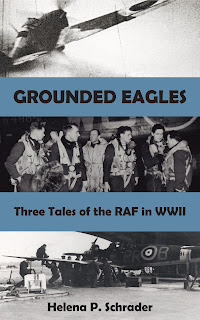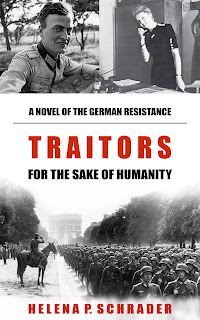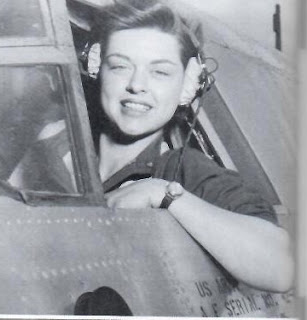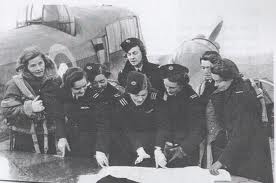There is a difference between historical accuracy and historical authenticity.
Historical accuracy gives historical fiction credibility --
but historical authenticity is what makes it fly.
As a rule, it much easier to get all the facts right, than to capture the atmosphere of a past era. Yet the difference between naked accuracy and an authentic feel is like the difference between the detailed diagram (above) of a Lancaster and an evocative photo of the same subject (below).

Atmospherics, on the other hand, can't be "googled" at all. You can't ask "what was it like being a Corinthian woman in 5th century BC?" You can't even get a coherent (much less comprehensive) answer asking about "how were Russian women pilots in WWII treated by their comrades?" The atmospherics which give a novel an authentic feel have to be constructed carefully by the author.
On the one hand, this requires researching objective factors such as architecture, fashion, means of transportation, geography, vegetation and climate. In other words, the author must become familiar with the environmental factors that will determine the setting or external features of the world in which the characters "live." This can be trickier than it sounds. For example, novels set in the crusader states routinely depict the Kingdom of Jerusalem as a desert wasteland (the Sahara was used for filming of "The Kingdom of Heaven," for example). In fact, however, the Kingdom of Jerusalem was famous for it's gardens, water-intensive agriculture such as sugar-cane production, and cities surrounded by orchards and other vegetation. Yes, pilgrims who generally spent only the summer in the crusader states often reported on the heat and dust, but the Mediterranean has heavy rains in the winter months and, furthermore, the Latin states in the Levant were very advanced in the use of aqueducts while also investing heavily in widespread irrigation.
Other problems arise from a shallow understanding of things we think we know about. Few novelists writing a novel set in the 18th century would forget that people back then rode horses, but unless they have had more than a passing encounter with horses they tend to fall into the pitfall of thinking that all horses are the same and anyone can easily ride any horse without difficulties, and also forget that horses needed to be fed, watered and rested frequently. Or, to use another example, authors know that people in the past used sailing ships, but too few authors take the time to become familiar with the sailing characteristics of various craft. Too many people nowadays apparently don't know that a sailing ship can't sail into the wind, and that ships could rarely sail directly to any point. Another frequent mistake is to be imprecise when doing research and assume that armor or plumping or clothing was the same throughout the entire Middle Ages, for example. Getting the environmental details right is essential to setting the stage for a book. An absence of detail -- or worse yet, the wrong details -- can ruin a book just as surely as flat characters or a boring plot.
Yet, when you get down to it, finding out about climate, costumes and technology is really just a matter of doing enough research. Far more difficult is discovering information about subjective aspects of a bygone era. Things like:
- how a social or economic system impacted daily life,
- how the legal system could play havoc with the best laid plans of men,
- how religious beliefs inhibited sexual behavior,
- how family structures and inheritance laws disrupted lives and the like.
Depending on the period in which the book is set, there may be good social histories that address some of these issues, but there might not. Surer guides to these kinds of issues are diaries, letters and memoirs written by people who lived in a specific era. It is vital, however, to read multiple documents from as many sources as possible in order to distinguish general conditions from unique experiences and perspectives. One of the great advantages of writing about the more recent past is the greater ease of access to these kinds of sources. When writing about the last century, for example, we have tens of thousands of digitalized newspapers, film archives, etc. etc. Certainly, my research on the Battle of Britain and Bomber Command were made easier by the scores of memoirs and online archives of interviews.
Yet even such apparently reliable sources can deceive -- not because they are wrong but rather because they often don't explain aspects of life that were "self-evident" or normal to those living at the time, but not to us. I recently loved a film that I found very convincing, only for someone who had lived through the event depicted to furiously point out everything that was wrong with the details.
All any author can do is his/her best, but being aware of the importance of getting the atmospheric details right is a good first step. Unlike a work of non-fiction, a good novel must always appeal to the emotions and psyche, not just the mind, of the reader.
Riding the icy, moonlit sky, 
they took the war to Hitler.
Their chances of survival were less than fifty percent.
Their average age was 21.
This is the story of just one bomber pilot, his crew and the woman he loved.
It is intended as a tribute to them all.
Buy now on amazon
or Barnes and Noble.
 Disfiguring
injuries, class prejudice and PTSD are the focus of three
heart-wrenching tales set in WWII by award-winning novelist Helena P.
Schrader. Find out more at: https://crossseaspress.com/grounded-eagles
Disfiguring
injuries, class prejudice and PTSD are the focus of three
heart-wrenching tales set in WWII by award-winning novelist Helena P.
Schrader. Find out more at: https://crossseaspress.com/grounded-eagles

"Where Eagles Never Flew"
was the the winner of a Hemingway Award for 20th Century Wartime
Fiction and a Maincrest Media Award for Military Fiction. Find out more
at: https://crossseaspress.com/where-eagles-never-flew
For more information about all my books visit: https://www.helenapschrader.com


.jpg)












.jpg)
